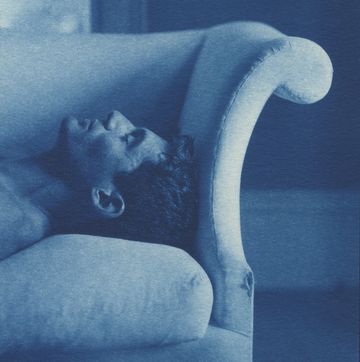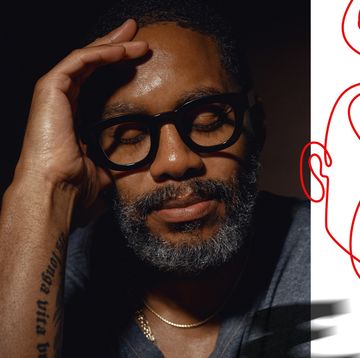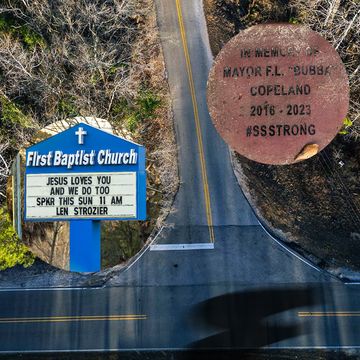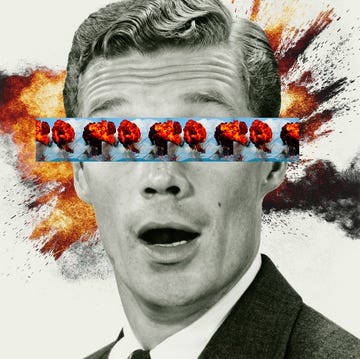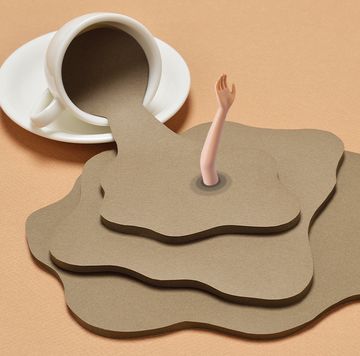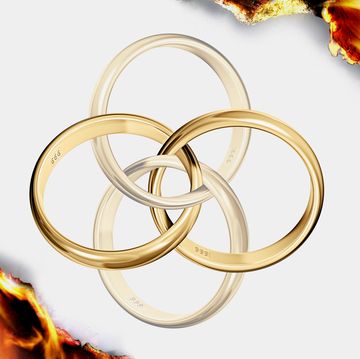In my twenties, I had a friend who used to show up at my doorstep uninvited with a six-pack of Red Stripe. She had a terrible job and a worse boyfriend, and whenever either was bumming her out, she’d plop down on the orange couch that my roommate had gotten from her dead great-aunt and tell us everything. In 2017, she moved to Montana, and I suppose if I had to pinpoint it, I’d say that’s when the trouble began.
One day it became undeniable that I had a friendship void in my life. I didn’t lose my friends. There was no big dustup or disaster. No romantic rivalries or fights about politics had gotten in the way. They didn’t even go missing, exactly—I knew where they were. After Red Stripe landed in Missoula, the couple whose deck we used to grill sausages on decamped to Vermont. Around the same time, L. A. started acquiring my friends at an alarming rate, and the ones who remained all seemed to have colicky babies or punishing home-renovation projects on their hands. I admitted to myself that I’d had a hand in it, too: After all, I hadn’t changed cities in fourteen years, a job in five, or a romantic partner since Obama’s first term.
I am not alone. (Except, I guess, literally.) Americans have become terrible at making and keeping friends. Here’s an incomplete list of phenomena that experts in the subject have blamed for this: apartments without dining rooms, Covid-19, “technology,” babies, not enough hiking. Whatever the cause, we’re a nation afflicted. This is particularly true for men. (If you cannot name even a single close friend, you’re not the only one: 20 percent of single men are stuck in the same position, trapped in what is being dubbed a “friendship recession.”) In 2023, a surgeon general’s advisory declared loneliness and isolation an “epidemic,” and I was showing worrying symptoms. I had a spouse, a child, a dog, a career—and almost nobody else to hang out with.
But the magnitude of my problem didn’t become overwhelming until a gorgeous spring evening when I texted the group chat after one member reported having “a shitstorm of a day.” Did anyone want to grab a bite and talk it out? Not one person said yes. I was, in fact, ridiculed for the very suggestion. (“You love a last-minute plan lol” came the reply.)
I knew that I technically had friends, but none of them ever seemed to want to hang out. Even if the six-pack friend still lived in Brooklyn, I had a hunch that now that she has a toddler, her visits wouldn’t be as frequent or as spontaneous as they had been a decade ago. I couldn’t remember the last time I had gotten a text that said something like “what’s up tonight?”
New York City, where I live, has more than 8 million residents, and apparently I did not know even one who’d be willing to grab a beer with me on a Tuesday night. So I briefly fantasized about moving, thinking it might give me an excuse to cultivate new friendships in my mid-thirties without seeming like a loser. Maybe a friend group in Portland or Tucson or Ann Arbor would invite me to join their trivia team or their supper club? We’d swing by one another’s tastefully shabby houses with some kind of homegrown fruit to share. Perhaps I would crash and eventually come to dominate a pickleball group. In this new city of my dreams, everyone would have a firepit, and everyone would use it regularly. But all it took to quash that fantasy was a little reading. When the Atlantic writer Katharine Smyth moved to a new city at forty with “a long list of people whom my friends, and friends of friends, had suggested that I meet” in hand, it wasn’t all that easy. “Unfortunately,” she wrote, “these contacts weren’t as eager as I was about the prospect of new friendship.”
Why it’s so hard to make friends as an adult isn’t rocket science. Dr. Marisa Franco, a psychologist and the author of the book Platonic: How the Science of Attachment Can Help You Make—and Keep—Friends, described what it takes to Boston radio station WBUR. There are basically two conditions that need to be met for people to develop a friendship “organically”: “continuous unplanned interaction and shared vulnerability.”
This made intuitive sense to me. I do have friends, close ones (have I said that enough yet?), but with few exceptions, they’re people I met in high school, college, or those years after college when “shared vulnerability” is less of a precondition for friendship than it is an entire lifestyle. When you’re in college, “continuous unplanned interaction” is the name of the game. When you live with roommates, same deal. “Shared vulnerability” is almost impossible not to feel when you’re on your third or fourth Natty Light at the house party.
It also helped me feel less embarrassed about the fact that although I’m friendly with my coworkers, I can think of only one who might reasonably describe me as a “friend” to a third party. In an office, there’s plenty of continuous unplanned interaction, but vulnerability rarely goes much further than shared gripes about budget cuts or the boss man. Outside of work, it takes a Herculean effort and untold Google Calendar server space to coordinate so much as a happy hour.
I liked Dr. Franco’s description so much that I bought her book. But things got off to a rocky start from the jump, with these words:
I’m so proud of you, reader, for embarking on this journey.
Proud of me? Insulting! Didn’t Dr. Franco hear me when I said I already had friends? They were just busy right now!
I collected myself. I realized that I sounded like a sixth grader describing his beautiful girlfriend “from camp” and read on.
Dr. Franco rightly points out that people destroy their own chances at friendship by fearing rejection. I was guilty of that, no doubt. She’s big on authenticity and vulnerability. Sometimes she verges on the obvious, suggesting that readers “share helpful information with friends” as a way of expressing generosity, but for the most part—and to my great dismay—the advice in the book is pretty much sound. I felt confident that enacting it would be excruciating. I was going to have to “muscle through [my] fear of rejection to say hello.”
I decided to give myself one month to make one friend.
That was it. If I couldn’t do it in a month, I figured I probably couldn’t do it at all. To keep myself accountable, I would write about it. I’d start with a list of rules.
First, I’d have to define “friend” for our purposes. Deceptively tough. Would meeting for one coffee do the trick? Surely not. What about four? What if we did something a little more involved, like seeing a concert or taking a cooking class? We’d have to develop some recurring jokes, memories, shared enemies for it to count. Friendship requires a knowledge base, too: Can you really declare yourself friends with someone if you don’t know their brother’s name or what their girlfriend does for a living? How much work should it take? I wound myself up trying to make a discursive distinction between that which makes someone a friend and that which makes someone a good friend before the damn project had even started. I had to cut my losses. I just needed someone I really—I mean, really—enjoyed hanging out with, someone whose problems I could take on as my own, someone who would take on mine as well.
More guidelines: An entirely new person entering my life and becoming a friend was the purest form of this assignment, I decided, but the upgrade of a friendly acquaintance into a friend was also permitted. Setups were allowed, as were recreational activities, but long-distance friendships were not. They had to be in town, with no plans to move to L. A. Reinvigorating closeness with an old friend wouldn’t cut it, either. (This rule brought me great pain when my husband and I spent a delightful afternoon getting drunk with my best friend from elementary school—whom I hadn’t talked to in a decade—and her absolute nutcase of a husband. In under an hour, we were exchanging “No, you were cool in high school”s.) Next!
Then came the question of method. The resounding advice was “Get a hobby.” But I had only a month, and I didn’t think I could learn a new skill while trying to make friends. I imagined myself at some kind of adult surfing camp with horror. I supposed I could call my dog a hobby and meet someone at the dog park. But I recalled the mixed results I got last time I tried that. (I found myself spending more time with the dog of my alleged dog-park friend than with the friend herself, as she dumped poor Caleb at my doorstep every time she had to leave town, which was suspiciously often.)
A friend who, I regret to tell you, lives in L. A., where she has a thriving social life, offered wise advice. “I think because I’ve dated a lot in my thirties, I’ve come to think of it in a similar way, where you almost have to treat it like a hobby in that it’s time-consuming and something you have to work at. And in its best version, I think you learn a lot about yourself, because you learn how to tell your story to people who don’t know your context and learn theirs.”
So no hobbies. This would be my hobby. Anyone who cared about my story already knew it by heart, and I hadn’t told it in years. I wasn’t even sure I knew what my story was anymore.
I entered the project like a newborn horse—happy to be here but awkward and unsure which way to run. I was feeling shy, so I figured I’d read up on the theory before putting anything into practice. I started with Dale Carnegie’s 1936 classic How to Win Friends and Influence People. I was less interested in influencing people than in winning friends, but I wouldn’t object to some incidental influencing. The book has much to offer the reader who agrees with the statement “Dealing with people is probably the biggest problem you face, especially if you are in business.” It has less to offer a reader like me, who is looking for someone to text on a Thursday for a burrito in a couple hours. But still, it has a few nice lessons.
Carnegie explains that people crave appreciation “almost as much as they crave food.” He has nice little bons mots like “Let’s realize that criticisms are like homing pigeons. They always return home.” His basic message is that you should make a sincere effort to notice good things about the people around you and make a point of telling them you’ve noticed. Try to be less critical, because everyone hates criticism.
I toted the book around with me for the first week of the project, hoping someone on the bus would ask me what was up with that. No one did, so I seized the initiative. “I’m doing this project where I try to make a friend in a month, so I’m reading this cheesy book,” I’d say to various strangers wearing AirPods. (Should I even bother telling you this didn’t work?)
I abandoned the book but not the bus. One morning I sat across from a dad who was trying to persuade his child to eat an allegedly yucky banana. “Bananas are such drama,” I said to him in sympathy, then asked how old the kid was. This question is the universally understood invitation to a conversation between parents. His kid was three, mine is one, and it turned out we were headed to the same day care. Play it cool, I thought to myself, this is a potential friend.
We talked for a few blocks about how much he loves the Knicks, and he told me about his wife’s job at a nonprofit. We agreed it was helpful to have one parent who works from home. At drop-off, I suggested getting together sometime. I didn’t bother to ask for his number; I figured I’d see him tomorrow doing battle over another banana. But I never saw him again.
No problem. The lesson was that I needed to be more deliberate. Friends weren’t just going to happen to me. Babies may have been partly to blame for the disappearance of my old friends, but perhaps they could also be a solution. When we first had our baby, people went out of their way to tell us how easy it would be to make friends now that we had a kid. So I signed my daughter up for a parent-and-me swim class that met every Saturday morning at a high school. We arrived early so I could scope out the friend potential. She sat on my hip in her towel with a dinosaur tail and sucked her thumb. I felt the same way.
“Have you done this before?” I asked the dad of a kid who looked on the verge of tears. Before he could answer, the child started wailing. The class itself was no better. We paraded the babies around while singing water-themed songs, which required most of our faculties of concentration. “I can’t believe how warm this water is,” I offered to a mom during a break in the action. “Sorry, what?” she asked over the din of indoor splashing. I repeated myself, and she said she couldn’t hear me again. “We would like to welcome Felix / to the swimming pool,” the class sang to a weeping Felix in the gentlest tones any of us could manage, and I began to despair of the baby-bonding plan.
The indignities continued to pile up. Worst of all was when people I thought were already my friends, upon hearing of the project I was undertaking, offered to become my friend. This happened for the first time (but not the last!) at a one-year-old’s birthday party. My intention was to ask a friend to set me up with one of her friends. After realizing her mistake, she vigorously reassured me of our status as already-friends for the next half hour as I glumly munched on birthday cake. She promised to put me in touch with a friend of hers by text. The next week, she invited me to a basketball game. She began the invitation by saying, “Since we are already friends. . .”
I asked another friend to hook me up with a friend of hers, and bless her, she obliged. In terms of efficacy, blind dates were an obvious improvement over carting Dale Carnegie around on the bus, but they only seemed to heighten my weird behavior. Everything I did on these friend dates was aggressive, pathetic, or insane. In a text message during the lead-up to one of them, I referred to the Brooklyn neighborhood of Carroll Gardens as “the CG,” a nickname no one has ever used. I showed up ten minutes early to one hang and sat at the bar reading Salman Rushdie’s memoir about getting stabbed in the eye. Another time, I lied about my age (I subtracted a year), then had to keep up the lie throughout an extended story about my junior year of college. I cannot explain why I did this.
Part of the issue was how interested the dates were in the project itself. This is understandable and I should have anticipated it, but it ate up a ton of time as I talked about myself, against Dale Carnegie’s warning that people care less about you than about whether you care about them. On the date where I lied about my age, my potential friend expressed no hope that I could make one friend in one month. “It’s so inorganic,” she said.
She had recently befriended a group of senior citizens at her local library who gathered each week to play Scrabble, so she was eager to share advice. (“You should go tomorrow!” she said.) In fact, she’d gotten so close to this group that she and Barbara, seventy-four, were writing a romance novel together. None of what she was describing appealed to me at all. I told her I would never do that, and she shrugged as if to say, “Maybe that’s why you don’t have any friends.”
As much as I would rather eat a bowl of Scrabble pieces than ask if I could join Barbara’s tournament, the story filled me with longing to be friends with someone who would do that. It occurred to me that it had been a mistake to seek out people who were similar to me. My existing friendships were safe, predictable, and pure pleasure. But maybe that wasn’t such a good thing. Those relationships may have become logistically complex, but they were so cozy that it was sometimes hard to discern where I ended and a friend began. This new person was telling me her story, and the contrast with mine made me feel more legible—like I was really a person in the world. I remembered my single friend’s words: “. . . in its best version, I think you learn a lot about yourself, because you learn how to tell your story to people who don’t know your context and learn theirs.” This was it! I was doing it!
My potential friend suggested, as a kind of expressway to intimacy, that we share a secret with each other that we’d never told anyone else. Mine made me sound like a psychopath, but hers made me adore her all the more. By the second round of drinks, I knew what kind of books her older sister reads and what her parents’ divorce was like (not great). She now knew all about the death of my brother’s dog and what my parents’ divorce was like (also not great).
The spell broke when she checked her watch. We split the check and said thank you for the round we’d each bought. We’d do it again! Soon! While we were at the bar, a rainstorm had begun, so we darted away with purpose. It had been a totally fun night, but as I watched her shuffle around the corner, I knew in my heart that she would never show up to my home with a six-pack after a terrible day at work.
It was public knowledge around the office that I was undertaking this project. At our morning meeting each day, my coworkers would ask if I’d made a friend yet. At first there was a breeziness to the question, but the more I answered no, the more knitted the brows around the table got. Their worry seemed to be escalating, so in the early hours of the morning a couple days before my allotted month ran out, I downloaded an app called Bumble for Friends. I’d been hesitant to do this, because, well, obviously. But time was running out. With great humility, I tell you that I composed the following profile: “Writing for a men’s magazine, mom of a toddler, owner of a very bad dog. More or less always trying to drink a beer in the sun.”
I will not debase myself by telling you how long it took me to write that, but I will share that an early draft contained the regrettable phrase “I love to keep it low-key.” I spent a great deal of time trying to decide if I should include my political views. Could I ever really befriend someone who didn’t share them? I thought about how much pleasure I got from hearing about the Scrabble friend’s life and decided I should at least try. Profile complete and free from any mention of Karl Marx, I swiped through blurry image after blurry image of transplants from Amsterdam who spent their free time baking and exploring all the city has to offer. Nurses who loved house music. Owners of rescue dogs who reported that their real friends had all moved to Austin. There appeared to be some sort of law requiring each profile to mention yoga.
I scoffed at profiles that read “Up for anything but especially exploring new restaurants and adventures ;)” as though I did not enjoy those very things. Swiping also had the effect of alerting me to the superficial qualities I seemed to like and dislike in people, and I didn’t love what I saw. (Cat ownership struck me as a red flag, which was nonsensical, since many of my closest current friends own cats. And woe betide the person whose idea of a perfect Sunday included “crafting.”) Although I was, by definition, the same as everyone else on the app, I judged them in a way that was not at all Dale Carnegie–approved. All of these people were admitting to some measure of loneliness and excited to remedy that with a pottery class. The longer I swiped, the more I hated myself for not loving these openhearted potential friends.
I also hated myself for failing to be empathetic in the past toward my existing friends who had to do this in search of romance. I’d underestimated the injury that comes along with having to distill yourself into a bio this short, and the low-grade but unmistakable fear that a swipe in the wrong direction could mean kissing a possibly wonderful future goodbye.
The worst of it, though, wasn’t imagining myself meeting one of these people for a kickboxing class; it was wondering what came next. We’d just be two people floating in a little world of brunch, outdoor concerts, and keeping it low-key? It filled me with loneliness more unbearable than what I’d started with. I texted my existing friends, “I can’t believe I thought this would be a fun assignment.” It was 3:00 A.M., but they were awake. After all, they live on the West Coast.
I realized I didn’t really want one friend at all; I wanted a bunch of them. I wanted them to come over for a burrito, to meet after work when someone had gotten laid off, or broken up with, or hired. I wanted a congress of nonexperts to examine my suspicious-looking moles. To pick up my kid when I was stuck at work late. To happen to be around the corner, wondering if I could go for a bagel. I wanted something that no one person could possibly supply, and that was to live better. What I really wanted was something that, for some reason, despite its near-universal popularity, we’ve constructed society to make nearly impossible: hanging out casually when the mood strikes, with a bunch of people who know us deeply and love us anyway.
“Priests in the Middle Ages distrusted friendship,” Dr. Franco writes, “fearing its love could eclipse our love for God.” Could you blame them? If you don’t have friends, you’re not in much danger of talking to anyone who might, in quiet tones, reassure you that you’re not crazy—those wafers really are just wafers. Capitalism hums on for much the same reason. Without true friends, there’s no way to trust that it’s safe to say, “Hey, this is stressful.” It’s much easier for the boss if employees, in their intimacies only with themselves, shrug and figure that’s just the way life is. The place where most of us spend most of our waking hours works best if your main use for winning friends is influencing people.
On the last day of the month, I broke the news to my coworkers: I hadn’t added to my friend tally. It was almost a relief. The better world I was sure was possible would take more than a month to build. Put another way: I had failed. I’d resigned myself to a life of catch-up coffees, halfway intimacies, and adult softball leagues. I told myself it took bravery to confront this reality. Maturity. A group of friends was not going to appear on my stoop one day with a basket of cookies and a decade of shared memories. “You’re just what our intimate collection of souls was missing,” they would not say, before plopping themselves down on my rug as though my casa were their casa. To get there, I’d have to start with one friend. I’d have to do as Dr. Franco said and muscle my way through an immense amount of discomfort, and then I’d have to do it again. My coworkers nodded respectfully before moving on to the next agenda item.
To make a friend requires so much bravery, so much energy, so much work. I supposed I just didn’t have it in me. Then my phone lit up with a text, interrupting this grim thought. It was Scrabble woman! She wanted to hang out again. She wanted to hear more secrets. I wanted more, too. It would be hard to make a date to hang out again, I knew, but it suddenly struck me as harder not to. It would take more energy and even more bravery to steel myself for an existence in which I didn’t learn more of Scrabble woman’s secrets. Yes, I’d love to hang out. I’d love to embarrass myself again, to expend time and energy I didn’t have. I’d love to take a risk and maybe to suffer. I’d love to be friends.
Photographs by Joe Lingeman
Prop styling by Heather Greene











